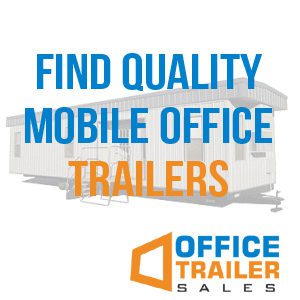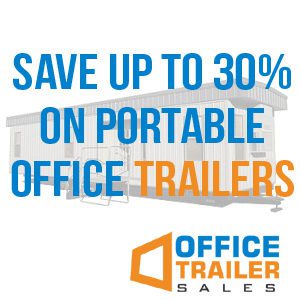
The Benefits of Weather-Resistant Office Trailers in Construction
In the dynamic and often challenging world of construction, adaptability and resilience are key to success. This is not just true for the workforce but also for the very infrastructure that supports construction projects. Among these, office trailers play a crucial role, serving as command centers on construction sites. However, their effectiveness is heavily contingent on their ability to withstand diverse and often harsh weather conditions.
Imagine a typical construction site – it’s a beehive of activity with workers, machinery, and materials all in constant motion. Amidst this bustle, the office trailer stands as a pivotal hub. It’s where project plans are developed, meetings are held, and crucial decisions are made. But what happens when extreme weather strikes? Be it the scorching heat of summer, the unyielding rain of the monsoon, or the biting cold of winter, the weather can significantly impact the functioning of these mobile offices.
This is where weather-resistant office trailers come into the picture, designed to stand firm against the elements. Whether it’s enduring high temperatures or providing a warm refuge in cold climates, these specialized trailers ensure that the administrative heartbeat of the construction site keeps pulsing strongly, regardless of the weather outside.

Breaking Down the Importance of Weather-Resistant Office Trailers
But why exactly are these weather-resistant office trailers so vital for construction projects? How do they contribute to the efficiency and success of these ventures? In this comprehensive guide, we delve into the world of office trailers tailored for the construction industry, focusing on their weather-resistant features and the myriad benefits they bring to the table. From the nuances of their construction to the practical benefits they offer, we’ll cover all you need to know about making the right choices for your construction needs. So, let’s embark on this journey and explore how these robust structures are revolutionizing on-site project management, one weather challenge at a time.
The Role of Office Trailers in Construction
Office trailers have become an integral part of modern construction sites, offering a unique combination of mobility, functionality, and adaptability. But what roles do these structures play, and why are they so crucial for construction projects? Let’s dive into the diverse functions and inherent advantages of office trailers in the construction realm.
Centralized Command and Control Centers
At their core, office trailers serve as the command center for construction projects. They house the key personnel responsible for overseeing project progress, from project managers and architects to administrative staff. These mobile offices become the nerve center for all communications, decisions, and coordination efforts. Essential tasks, such as project planning, client meetings, and real-time problem-solving, occur within these walls, making them indispensable for efficient project management.
Flexible and Adaptable Workspaces
Construction projects are dynamic, often requiring quick adaptations to changing needs and circumstances. Office trailers offer unparalleled flexibility in this regard. They can be quickly set up, dismantled, and relocated as the project evolves, ensuring that key personnel are always close to the action. This mobility is particularly advantageous in large-scale or multi-phase projects, where operations may shift across different areas of the construction site.
Safe and Secure Administrative Spaces
Safety and security are paramount on any construction site. Office trailers provide a secure space for storing important documents, plans, and equipment. They are equipped to handle sensitive information securely, away from the hustle and bustle of the main construction activities. Moreover, these structures can be fortified with additional security measures, such as reinforced locks and alarm systems, for enhanced protection.
Enhanced On-Site Efficiency and Productivity
Having an on-site office significantly boosts overall project efficiency. It reduces the time and resources spent on travel between off-site offices and the construction site, enabling quick response times to on-site developments. It also allows for better monitoring of the construction progress, leading to more proactive management and decision-making.
Customizable to Meet Project-Specific Needs
One of the greatest advantages of office trailers is their customizability. They can be outfitted and arranged to meet the specific needs of each construction project. From basic setups with desks and filing cabinets to more elaborate configurations with meeting rooms, restrooms, and kitchen areas, these trailers can be tailored to provide all the necessary amenities of a traditional office.
Facilitating Compliance and Documentation
Construction projects come with a plethora of regulations and documentation requirements. Office trailers provide a dedicated space for managing these complexities. They allow for the orderly storage and easy access to permits, legal documents, blueprints, and compliance records, ensuring that all regulatory aspects of the project are handled properly.
A Hub for Collaboration and Communication
Lastly, office trailers act as a hub for collaboration. They provide a space where various stakeholders can come together to discuss and align on project goals, timelines, and methodologies. This collaborative environment is essential for fostering teamwork and ensuring that all parties involved are on the same page.

Office trailers in construction are more than just temporary structures; they are pivotal for the smooth and efficient execution of projects. As we explore further, we will delve into the specific challenges posed by different weather conditions and how weather-resistant office trailers are designed to meet these challenges, ensuring that construction projects remain on track, regardless of what the weather has in store.
Understanding Weather Challenges in Construction
Weather plays a critical role in the construction industry, impacting not only the pace of work but also the safety of the workers and the durability of the equipment and materials. Various weather conditions, from scorching heat to freezing cold, present unique challenges that construction projects must navigate. Understanding these challenges is essential for effective project management and for ensuring that on-site facilities, like office trailers, are adequately prepared.
Extreme Heat
High temperatures can significantly affect construction sites, posing health risks to workers and impacting the efficiency of equipment. Prolonged exposure to heat can lead to heat exhaustion or heat stroke among workers, necessitating measures like increased hydration breaks and shaded rest areas. Heat can also affect the performance of machinery, with overheating being a common issue, and can accelerate the curing time of certain materials, affecting the quality of the work.
Intense Cold and Frost
Conversely, extreme cold conditions bring a different set of challenges. Cold weather can cause materials like concrete to freeze and crack, jeopardizing the integrity of the construction. It also poses risks to the health and safety of workers, with hypothermia and frostbite being serious concerns. Moreover, many types of construction equipment are less efficient or can malfunction in freezing temperatures.
Heavy Rain and Flooding
Rainfall, particularly heavy or prolonged, can cause significant disruptions on a construction site. It can lead to waterlogged grounds, making it difficult to operate heavy machinery safely. Flooding can halt construction activities altogether, and persistent dampness can increase the risk of mold and affect material quality. Managing stormwater and ensuring proper drainage becomes a priority in such conditions.
Strong Winds
Wind is another critical weather factor in construction. High winds can make it unsafe to operate cranes and other tall machinery, increase the risk of falling debris, and can even lead to structural instability in partially completed structures. Ensuring that materials are securely stored and that temporary structures are adequately anchored becomes essential in windy conditions.
Variable Weather Conditions
In many regions, weather can be unpredictable, changing rapidly from clear skies to storms. This variability requires construction projects to be adaptable and to have contingency plans in place. It underscores the need for robust, weather-resistant facilities, like office trailers, which can provide reliable operations regardless of weather changes.
Weather challenges in construction are diverse and demand strategic planning and adaptable solutions. Weather-resistant office trailers are designed to withstand these varying conditions, ensuring that the management and administrative functions of construction projects continue unhindered.

Key Features of Weather-Resistant Office Trailers
In the face of diverse and often harsh weather conditions, weather-resistant office trailers stand as a beacon of resilience in the construction industry. They are specifically designed with features to combat environmental challenges, ensuring that operations within them remain unaffected and productive. Among these features, insulation plays a pivotal role, adapting these mobile offices for both hot and cold climates.
The Critical Role of Insulation
- Adaptability to Temperature Extremes: Insulation is key to maintaining a stable internal temperature, regardless of the external weather conditions. In hot climates, it helps keep the interior of the office trailer cool by reflecting heat and reducing the burden on air conditioning systems. In contrast, in colder environments, insulation retains heat, ensuring a warm and comfortable workspace.
- Energy Efficiency: Well-insulated office trailers are energy efficient, which is not only environmentally friendly but also cost-effective. Proper insulation reduces the need for excessive heating or cooling, leading to lower energy consumption and utility costs.
- Enhanced Comfort and Productivity: A comfortable working environment is crucial for the productivity and morale of the staff. Insulation contributes to this by creating a stable and comfortable internal atmosphere, free from the extremes of outdoor temperatures.
Types of Insulation Materials Used
- Fiberglass Insulation: One of the most commonly used materials, fiberglass insulation is effective and affordable. It’s made from fine glass fibers and is particularly adept at slowing the spread of heat, cold, and sound in structures.
- Spray Foam Insulation: Spray foam is known for its excellent thermal properties and air-sealing ability. It expands to fill every nook and cranny, ensuring there are no gaps or air leaks. This type of insulation is particularly useful in trailers that may have irregular spaces or hard-to-reach areas.
- Rigid Foam Panels: These panels provide high insulation values and are often used in floors and walls. They are lightweight yet provide strong thermal resistance and are often chosen for their durability.
- Reflective Insulation: Reflective or radiant barriers are particularly effective in hot climates. They reflect radiant heat away from the office trailer, significantly reducing cooling costs in summer.
Other Weather-Resistant Features
Beyond insulation, weather-resistant office trailers incorporate several other features to withstand adverse weather conditions:
- Robust HVAC Systems: Heating, ventilation, and air conditioning systems in these trailers are designed to operate efficiently in extreme weather, ensuring a constant, comfortable indoor environment.
- Durable Exterior Materials: The outer shell of these trailers is often made from materials that are resistant to corrosion, moisture, and UV rays, ensuring longevity and durability in various climates.
- Reinforced Windows and Doors: Double-glazed windows and weather-stripped doors are common in weather-resistant trailers, providing additional insulation and preventing heat loss or gain.
- Specialized Roofing: Roofs are designed to be weather-tight and durable, with materials that can withstand heavy rain, snow, or intense sun.
Weather-resistant office trailers, with their advanced insulation and other tailored features, present a formidable solution to the challenges posed by extreme weather conditions on construction sites. By maintaining a stable internal environment, they ensure that the vital administrative and management functions of construction projects continue uninterrupted, regardless of the weather outside.

Windows and Doors: Ensuring Energy Efficiency and Weather Resistance
The design and construction of windows and doors in weather-resistant office trailers are crucial for maintaining energy efficiency and providing protection against diverse weather conditions. These components are integral to the overall functionality and durability of the trailer.
Double-Glazing for Enhanced Insulation
- Temperature Regulation: Double-glazed windows consist of two panes of glass with a space between them, which acts as an insulating barrier. This structure is highly effective in maintaining internal temperatures, keeping the office cooler in summer and warmer in winter.
- Noise Reduction: Apart from thermal insulation, double-glazing also offers significant noise reduction, which is particularly beneficial on bustling construction sites.
- Reduced Condensation: Double-glazed windows minimize the risk of condensation, which can be a problem in areas with high humidity or drastic temperature differences.
Weather Stripping: Sealing Out the Elements
- Draft Prevention: Weather stripping around windows and doors ensures that gaps are sealed, preventing drafts and keeping out dust, moisture, and pests. This sealing is especially important in areas prone to strong winds or heavy rain.
- Energy Savings: By preventing air leakage, weather stripping contributes to energy efficiency, reducing the workload on HVAC systems and leading to cost savings.
Robust Materials and Locking Mechanisms
- Durability: The materials used for windows and doors in weather-resistant office trailers are chosen for their durability and ability to withstand harsh environmental conditions.
- Security: Enhanced locking mechanisms and sturdy frames provide additional security, safeguarding the valuable equipment and documents stored within the office trailer.
Roofing and Foundation: Sturdy and Reliable
The roofing and foundation of an office trailer are key to its stability and weather resistance, particularly in extreme conditions like heavy rain, snow, and high winds.
Roofing Considerations
- Material Strength: The roofing materials are selected for their strength and longevity, with options like metal or reinforced composite materials being common choices.
- Waterproofing: Ensuring that the roof is waterproof is essential to prevent leaks during heavy rains. This is often achieved through specialized coatings or sealants.
- Snow Load: In areas prone to heavy snowfall, the roof design must consider the additional weight of snow. Reinforced roofing or sloped designs that allow snow to slide off can be effective solutions.
Foundation Stability
- Anchoring: Proper anchoring of the office trailer is vital for stability, particularly in windy conditions. Secure anchoring ensures that the trailer remains firmly in place, regardless of weather challenges.
- Leveling and Support: The foundation must provide a level base for the trailer, with adequate support to prevent shifting or sinking, especially in areas with soft or uneven ground.

Benefits of Weather-Resistant Office Trailers in Construction
Weather-resistant office trailers bring a multitude of benefits to construction sites, transforming the way project management and administrative tasks are conducted in the face of environmental challenges. Let’s explore the key advantages of these robust structures in a construction setting.
Enhanced Durability and Longevity
Weather-resistant office trailers are built to last. They are:
- Constructed with High-Quality Materials: Designed to withstand harsh weather conditions, these trailers use materials that are resistant to corrosion, moisture, and UV damage, ensuring they remain in good condition for longer periods.
- Designed for Tough Environments: Whether it’s extreme heat, heavy rain, or high winds, these trailers are engineered to handle the specific challenges of construction sites, reducing the need for frequent repairs or replacements.
Consistent Operational Efficiency
- Uninterrupted Work Flow: Regardless of weather conditions, work inside the trailer can continue without disruption. This consistent operational efficiency is crucial for meeting project deadlines and maintaining productivity.
- Comfortable Working Environment: With features like effective insulation and HVAC systems, these trailers provide a comfortable environment for staff to work in, which can lead to increased productivity and improved focus on tasks.
Cost-Effectiveness
- Reduced Energy Consumption: The energy-efficient design of weather-resistant trailers, including insulation and weather stripping, means lower heating and cooling costs, translating into significant savings over time.
- Minimized Downtime: By providing a reliable workspace regardless of weather, these trailers help avoid delays that can be costly in terms of both time and resources.
Improved Safety and Health
- Protecting Workers: A stable and controlled environment protects workers from extreme temperatures and adverse weather conditions, reducing health risks like heatstroke or hypothermia.
- Safe Storage of Equipment: These trailers offer a secure place to store sensitive equipment and materials, protecting them from weather-related damage.
Flexibility and Mobility
- Adaptable to Various Needs: Whether a project requires a simple office setup or a more complex arrangement with multiple rooms, weather-resistant trailers can be customized to suit these requirements.
- Easy Relocation: As project needs change or if the site layout is adjusted, these trailers can be easily moved to new locations, ensuring that the office is always where it’s most needed.
Enhanced Communication and Coordination
- Central Hub for Project Management: Having a dedicated, weather-proof space for meetings, planning, and coordination fosters better communication among team members, leading to more efficient project management.
- Facilitates On-Site Decision Making: With a fully functional office right on the construction site, decisions can be made quickly and efficiently, keeping the project on track.
Eco-Friendly and Sustainable
- Energy-Efficient Designs: Many weather-resistant office trailers are designed with sustainability in mind, utilizing energy-efficient windows, insulation, and other materials that reduce the overall carbon footprint.
- Reduced Waste: The reusability of these trailers for multiple projects over many years contributes to a reduction in construction waste.
Compliance and Professionalism
- Meets Industry Standards: These trailers are often built to meet specific industry standards and regulations, ensuring that construction sites remain compliant with various legal requirements.
- Enhances Professional Image: A well-constructed and maintained office trailer reflects positively on the construction company, presenting a professional image to clients and stakeholders.
Incorporating weather-resistant office trailers into a construction project offers a wide range of benefits, from ensuring uninterrupted productivity and operational efficiency to providing a safe and comfortable workspace for employees. Their durability, flexibility, and cost-effectiveness make them an invaluable asset in the construction industry, where adapting to environmental conditions is a critical part of successful project management.

The Pivotal Role of Office Trailers
We began by delving into the fundamental roles that office trailers play on construction sites. Serving as command centers, they are the hub for project management, decision-making, and essential communications. Their flexibility and adaptability make them invaluable, particularly in an industry where project dynamics and requirements can change rapidly.
Tackling Weather Challenges
The discussion on weather challenges highlighted the necessity for robust and resilient office structures. From extreme heat to freezing temperatures, heavy rains to high winds, each weather condition presents its own set of challenges. Weather-resistant office trailers are designed to withstand these varied conditions, ensuring that operations within remain uninterrupted and productive.
Key Features and Benefits
We examined the key features that make these trailers particularly suited for construction sites. With advanced insulation, double-glazing, weather stripping, and reinforced materials, these trailers offer enhanced durability, energy efficiency, and a comfortable working environment. They also contribute to cost savings, improved worker safety, and better overall project management.
The Importance of the Right Choice
Choosing the right office trailer for your specific construction project is crucial. The correct trailer not only stands up to the weather challenges unique to your site but also aligns with your project’s size, duration, and specific operational needs. It’s a decision that affects not just the efficiency of your operations but also the well-being of your team and the overall success of your project.
As you consider the specific needs of your construction project, we encourage you to think about how a weather-resistant office trailer could enhance your operations. Whether it’s dealing with the scorching summer heat, the unpredictability of rain, or the challenges of a windy environment, the right trailer can make all the difference.
We invite you to reach out to us for customized quotes. Our goal is to connect you with the best range of weather-resistant office trailers designed to meet a variety of needs and challenges.

Leave a Reply